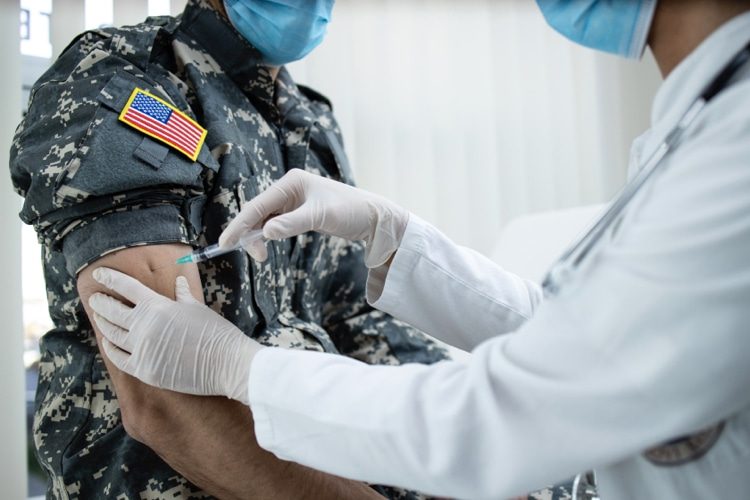
Four branches of the U.S. armed forces have announced COVID vaccination deadlines under a Pentagon mandate to jab the entire military, with the army becoming the latest to set the date.
According to the statement released by the U.S. Army Public Affairs on Tuesday, 485,900 active-duty servicemen are expected to be fully vaccinated by December 15, 2021 ,and 189,800 Reserve members and 336,000 of those who serve in the National Guard should get the shot by June 30, 2022.
The servicemen may choose to get whichever vaccine approved for use by the U.S. Food and Drug Administration (FDA) or by the World Health Organization (WHO).
Commenting on the decision, Lieutenant General R. Scott Dingle, the U.S. Army Surgeon General, said:
This is quite literally a matter of life and death for our Soldiers, their families and the communities in which we live. Case counts and deaths continue to be concerning as the Delta variant spreads, which makes protecting the force through mandatory vaccination a health and readiness priority for the total Army.
Per the Army Times recent report, 11 service members died of COVID complications in August, followed immediately by another death in the first few days of September, which brought the military’s total death count to 43. That, per the outlet, accounts for a COVID mortality rate among the military at 0.02 percent. While the number does not seem alarming (which it isn’t), it is observed that it is 50 times higher than last year’s death rate of 0.0004 percent. In total, the armed forces reported 233,218 COVID cases since February 2020, or 2 percent of all servicemen.
It is provided that soldiers may request exemptions from vaccination if they have a “legitimate medical, religious or administrative reason,” and that soldiers who are pending exemption requests will not be subject to adverse actions until the exemption is fully processed.
Further, the rule specifies that those high-ranking staff, such as commanders, command sergeants majors, first sergeants, and officers in Command Select List (CSL), who refuse to get vaccinated and have not filed for the exemptions, will face immediate suspension from their leadership role.
Those servicemen who have had COVID and rely on their natural immunity, which is proven to be a much better protection form the virus than a jab, are not “automatically exempt” from the rule and “should consult their primary care managers.”
According to the Pentagon’s most recent reported data, as of September 8, some 414,780 (or about 41 percent) active-duty, Reserve, and Guard troops were fully vaccinated, with another 191,988 partially vaccinated.
On August 24, the Department of Defense mandated COVID vaccination of all members of the Armed Forces. Mandatory vaccination against COVID, it was specified, will only use COVID vaccines that receive full licensure from the FDA. Only Pfizer’s Comirnaty vaccine, which is in short supply, has received such approval, not Pfizer’s abundantly BioNTech vaccine. However, BioNTech jabs may be used “interchangeably” with Comirnaty, even though regulators also noted the products are “legally distinct,” as detailed in a New American report.
At the same time, the Pentagon order said the servicemen are welcome to use any other vaccines approved for the emergency use in the United States, and those who are actively participating in the vaccine trials are exempt from the mandate.
Military.com explains that soldiers who refuse to comply with the vaccination rules will be counseled by their chain of command and, eventually, may face relief of duties and discharge.
Per the outlet:
“Such counseling typically involves starting a paper trail and having a discussion with the service member about the orders they are violating; it isn’t always followed by a punishment.
But continued failure to comply with the order “could result in administrative or non-judicial punishment — to include relief of duties or discharge,” according to a statement from the Army.
Commanders will request a General Officer Memorandum of Reprimand, which are largely seen as career killers, to be initiated for any soldier who refuses inoculation without an exemption.”
A discharge can cost a soldier his or her benefits, including the GI Bill, which helps soldiers pay for college, graduate school, and training programs.
The army’s announcement follows similar actions by the Navy, Air Force, and Marine Corps.
On Aug. 30 it was announced that the Marines and Navy servicemen must be fully vaccinated by November 28; reservists were given time to get shots by December 28.
On September 3, the Air Force set a November 2 deadline for all active-duty airmen to get inoculated, while other personnel are expected to comply by December 2.
As the mandate loomed over the military in late August, the Washington Post reported that “vaccine resistance among military remains strong,” citing the same grounds for concerns shared by the civilians. Military men believe the shots are not as safe as they are claimed to be and that the purported benefits of getting jabbed do not outweigh the risks of developing adverse reactions to the jab or getting sick with COVID. Some of the servicemen pointed to past instances of forced exposure to harmful vaccines or chemical agents.
Back in August, two staff sergeants, one Army, one Marine, filed a lawsuit against the Department of Defense (DoD), the Department of Health and Human Services (HHS), and the FDA, challenging plans to conduct mandatory COVID vaccinations of the military. The plaintiffs argue that the DoD, by setting the mandate, may not be abiding by their own rules. Namely, Army Regulation 40-562 “presumptively exempts from any vaccination requirement for a service member that the military knows has had a documented previous infection,” per the lawsuit. Which means that some 230,000 service members who have tested positive for COVID and recovered should not be forced to get a shot.



